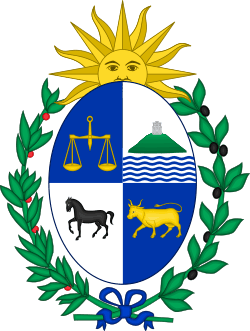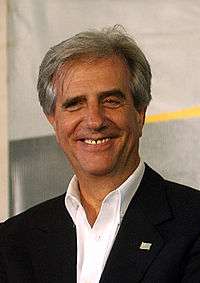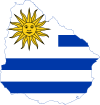Politics of Uruguay
 |
|---|
| This article is part of a series on the politics and government of Uruguay |
|
Legislative |
|
| Foreign relations |
|
See also |
|
|
The politics of Uruguay abide by a presidential representative democratic republic, under which the President of Uruguay is both the head of state and the head of government, as well as a multiform party system. The president exercises executive power and legislative power and is vested in the two chambers of the General Assembly of Uruguay. The Judiciary branch is independent from that of the executive and legislature.
The Colorado and National parties have been locked in a power struggle, with the predominance of the Colorado party throughout most of Uruguay's history. The elections of 2004, however, brought the Encuentro Progresista-Frente Amplio-Nueva Mayoría, a coalition of socialists, former Tupamaros, communists, social democrats, and Christian Democrats among others to power with majorities in both houses of parliament. A majority vote elected President Tabaré Vázquez.
In 2009, the Broad Front once again won the elections with a plurality of the votes. A presidential runoff was triggered because their candidate, José Mujica, only received 47.96 percent of the vote. The Broad Front's candidate easily beat Luis Alberto Lacalle of the Nacional Party in second round of voting. In addition to the presidency, the Broad Front won a simple majority in the Uruguayan Senate and Congress.
The Economist Intelligence Unit has rated Uruguay as "full democracy" in 2016.[1]
Constitution
Uruguay adopted its first constitution in 1830, following the conclusion of a three-year war in which Argentina and Uruguay fought as a regional federation: the United Provinces of Río de la Plata. Sponsored by the United Kingdom, the 1828 Treaty of Montevideo built the foundations for a Uruguayan state and constitution. A constitution proposed under the military dictatorship government was rejected by a referendum in 1980.
Executive branch

Uruguay's Constitution of 1967 created a strong presidency, subject to legislative and judicial balance. Many of these provisions were suspended in 1973 but reestablished in 1985. The president, who is both the head of state and the head of government, is elected by popular vote for a five-year term, with the vice president elected on the same ticket. The President must act together with the Council of Ministers, which comprises cabinet ministers, appointed by the president. Thirteen ministers head various executive departments. The ministers can be removed by the General Assembly by a majority vote.
Legislative branch
The General Assembly (Asamblea General) has two chambers. The Chamber of Representatives (Cámara de Representantes) has 99 members, elected for a five-year term by proportional representation with at least two members per department. The Chamber of Senators (Cámara de Senadores) has 31 members; 30 members are elected for a five-year term by proportional representation and the Vice-president who presides over it.
Judicial branch
The Supreme Court is the highest court.
Direct democracy
The Uruguayan constitution allows citizens to challenge laws approved by Parliament by use of a referendum or to propose changes to the Constitution by the use of a plebiscite.
Political parties and elections
| Party or coalition Presidential candidate |
First round (General election) | Second round (Presidential runoff) | |||||||
|---|---|---|---|---|---|---|---|---|---|
| Votes | % | Seats | |||||||
| Chamber | +/– | Senate | +/– | Votes | % | ||||
| Broad Front Tabaré Vázquez |
1,134,187 | 49.45 | 50 | 0 | 15 | –1 | 1,226,105 | 56.63 | |
| National Party Luis Alberto Lacalle Pou |
732,601 | 31.94 | 32 | +2 | 10 | +1 | 939,074 | 43.37 | |
| Colorado Party Pedro Bordaberry |
305,699 | 13.33 | 13 | –4 | 4 | –1 | |||
| Independent Party Pablo Mieres |
73,379 | 3.20 | 3 | +1 | 1 | +1 | |||
| Popular Assembly Gonzalo Abella |
26,869 | 1.17 | 1 | +1 | 0 | 0 | |||
| Partido Ecologista Radical Intransigente César Vega |
17,835 | 0.78 | 0 | N/A | 0 | N/A | |||
| Workers' Party Rafael Fernández |
3,218 | 0.14 | 0 | N/A | 0 | N/A | |||
| Total | 2,372,117 | 100 | 99 | 0 | 30 | 0 | 2,321,230 | 100 | |
| Invalid/blank votes | 78,329 | – | – | – | – | – | 156,051 | – | |
| Registered voters/turnout | 2,620,791 | 90.51 | – | – | – | – | 2,620,791 | 88.57 | |
| Source: Corte Electoral, Buenos Aires Herald | |||||||||
International organization participation
Uruguay or Uruguayan organizations participate in the following international organizations:
- The Food and Agriculture Organization (FAO)
- Group of 77 (G-77)
- Inter-American Development Bank (IADB)
- International Atomic Energy Agency (IAEA)
- International Bank for Reconstruction and Development (World Bank)
- International Civil Aviation Organization (ICAO)
- International Criminal Court (ICC)
- International Chamber of Commerce (ICC)
- International Red Cross
- International Fund for Agricultural Development (IFAD)
- International Finance Corporation (IFC)
- International Federation of Red Cross and Red Crescent Societies (IFRCS)
- International Hydrographic Organization (IHO)
- International Labour Organization (ILO)
- International Monetary Fund (IMF)
- International Maritime Organization (IMO)
- Interpol
- International Olympic Committee (IOC)
- International Organization for Migration (IOM)
- International Organization for Standardization (ISO)
- International Telecommunication Union (ITU)
- Latin American Economic System (LAES)
- Latin American Integration Association (LAIA)
- Mercosur
- United Nations Mission for the Referendum in Western Sahara (MINURSO)
- United Nations Organization Mission in the Democratic Republic of the Congo (MONUC)
- Non-Aligned Movement (NAM) (observer)
- Organization of American States (OAS)
- Agency for the Prohibition of Nuclear Weapons in Latin America and the Caribbean (OPANAL)
- Organisation for the Prohibition of Chemical Weapons (OPCW)
- Permanent Court of Arbitration (PCA)
- Rio Group (RG)
- Union of South American Nations (UNASUR)
- United Nations
- United Nations Mission in Sierra Leone (UNAMSIL)
- United Nations Conference on Trade and Development (UNCTAD)
- United Nations Educational, Scientific, and Cultural Organization (UNESCO)
- United Nations Industrial Development Organization (UNIDO)
- United Nations Mission in Ethiopia and Eritrea (UNMEE)
- United Nations Mission of Support in East Timor (UNMISET)
- United Nations Military Observer Group in India and Pakistan (UNMOGIP)
- United Nations Mission of Observers in Tajikistan (UNMOT)
- United Nations Observer Mission in Georgia (UNOMIG)
- Universal Postal Union (UPU)
- World Confederation of Labour (WCL)
- World Customs Organization (WCO)
- World Federation of Trade Unions (WFTU)
- World Health Organization (WHO)
- World Intellectual Property Organization (WIPO)
- World Meteorological Organization (WMO)
- World Tourism Organization (WToO)
- World Trade Organization (WTO)
References
- ↑ solutions, EIU digital. "Democracy Index 2016 - The Economist Intelligence Unit". www.eiu.com. Retrieved 2017-11-29.


.svg.png)